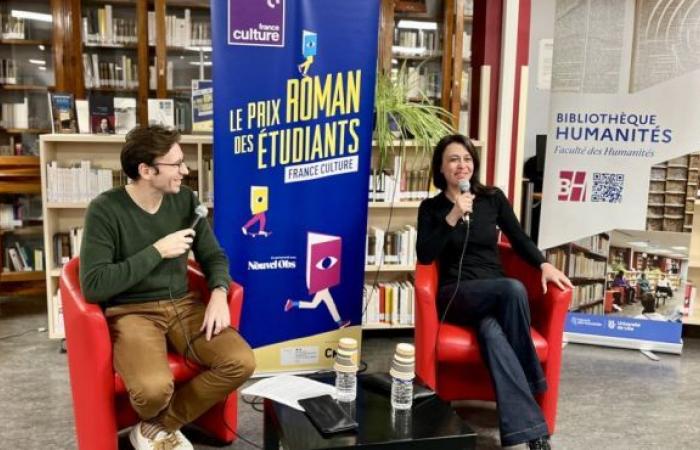
Students from the University of Lille met author Emmanuelle Lambert on Monday, November 18 as part of the Student Novel Prize.
This Monday, November 18, around a hundred students gathered in a library at the University of Lille (59), to meet the writer Emmanuelle Lambert, author ofNo Respect.
Each year, the Student Novel Prize rewards a work written in French, from the literary season and elected by a jury made up of students. For this twelfth edition, 2,500 French students are registered to vote, including 150 at the University of Lille.
In this context, students attend meetings or debate works, before voting and then present the prize to the winner on December 12. Emmanuelle Lambert was selected by France Culture, organizer of the Prize, alongside four colleagues.
More than a hundred students, mostly undergraduates, attended the meeting with Emmanuelle Lambert. © L'Etudiant – Amélie Petitdemange
Alexis Buffet, lecturer in French literature, began the meeting by presenting the author and her works, before continuing with a question-and-answer game. No respect is “autobiographical material,” he explains, although the work is written in the third person.
“It’s my life,” confirms Emmanuelle Lambert, “but to say ‘she’ is to talk about any normal young girl who finds herself in a literary world that is abnormal for her.”
“In your twenties, it’s hard to find your place”
The plot traces the story of a young woman of twenty, who discovers the microcosm of the Parisian literary world, dominated by men.
“It’s a female coming-of-age novel,” explains the author. I think that in our twenties, after graduating from high school, we have difficulty finding our place. I come from a relatively privileged background, but when I arrived in prep at Louis-le-Grand high school, I didn't understand what the other students were saying: their jokes, their cultural references…”
The book was also born from the reflections she had after the #MeToo movement : “It is also a book about forms of domination. I now have a different look at what seemed normal to me at the time. Why did my generation put up with what the current generation refuses with strength and reason? questions Emmanuelle Lambert.
Issues that speak to young people
His novel left its mark on the minds of the students present, overwhelmingly young women, whose experience of heroin echoed their own situation.
“What particularly resonates with me is the question of place. We have just received our first exams and grades, and we are wondering if we have our place here. Are we good enough? We have tendency to denigrate each other”, confides Elisa, a first year modern literature student, at the end of the meeting.
The student is also leaning towards this novel, as part of the vote which begins on November 22. “I'm going to choose it, because it’s a subject that concerns us in society : the place of women and relations of domination. I also liked the subtle writing style and this more objective distance established by the use of the pronoun 'she'.”
Nastia, 18, is also convinced. The first-year modern literature student says she is touched by “the questions addressed in the novel: this moment when we enter adult life, sexual assault, romantic relationships. The fact that she integrates an open relationship is also very modern,” she says.
Meet audiences far from bookstores
Emmanuelle Lambert would be “very honored” to receive a prize awarded by young people. “It’s the biggest compliment, because they are the future,” she says. Also selected for the Goncourt of high school students and the Goncourt of prisoners, the writer appreciates these meetings with “publics that we don’t see too much in bookstores, young people not necessarily having the means”.
For Elisa, this “very enriching” encounter desecrated the figure of the writer. “It’s interesting to see that they are normal people, like us, who are not pretentious, even if they are famous,” says the student.
Jade, in her first year of modern literature, is also delighted to participate in this prize. “In class, we study ancient literature, like Rabelais and Racine. The books selected are more contemporary, with subjects that speak to us more. I can’t wait to dive into reading them!”
Beneficial participation for studies
The 18-year-old student volunteered to read an extract fromNo Respect during the meeting. “I like eloquence and speaking in front of people, and I hope to gain points with this reading“, she explains to us.
Depending on the wishes of each professor, participation in the student jury may or may not be included in the courses, and possibly earn bonus points. Some teachers, like Alexis Buffet, have their students study extracts from the selected books. Others organize reading circles or debates.
“The requests vary. For example, some teachers ask to argue the vote. In our class, participation in the jury is not obligatory, but very encouraged, and it earns us bonus points“, explained Nastia.
Regardless, this experience will be useful for her studies and her future career, assures the student, who wishes to become a French teacher.
The five novels in the running for the Student Novel Prize:





